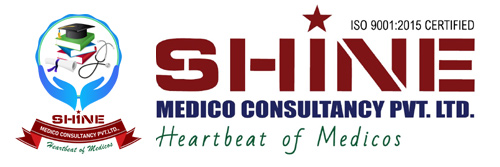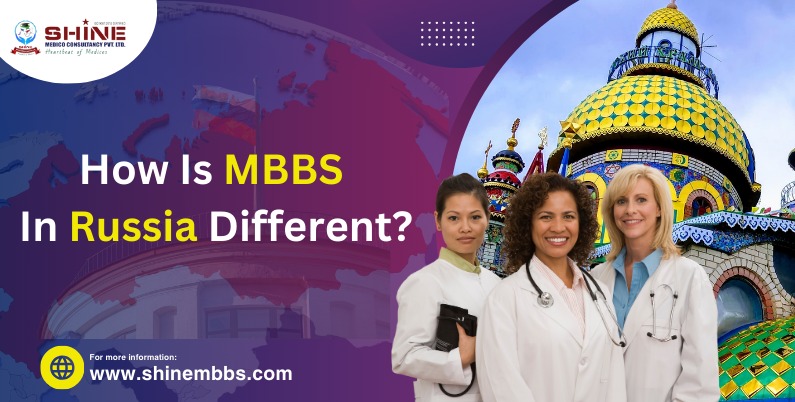How Is MBBS In Russia Different?
How does MBBS in Russia differ?
Getting an MBBS degree is a big step for future doctors, and choosing the right country for medical education is very important. Russia has become a top choice for international students who want to study MBBS. This Guide looks at How Is MBBS In Russia Different? from other countries and gives a detailed information.
Studying MBBS in Russia provides wide range of benefits and challenges that make it different from medical education in other countries. This article looks at these differences in simple terms, covering aspects like cost, language of instruction, quality of education, and more.
Table of Differences: MBBS in Russia vs. Other Countries
| Aspect | MBBS in Russia | MBBS in Other Countries |
| Cost of Education | Generally lower tuition fees and cost of living | Higher tuition fees and cost of living, especially in countries like the USA, UK, and Australia |
| Language of Instruction | Courses available in English and Russian | Predominantly in the native language or English |
| Quality of Education | High quality, WHO and UNESCO recognized, modern facilities | Varies greatly; top universities have high standards, but not all are WHO recognized |
| Clinical Exposure | Extensive, with hands-on training in large hospitals | Varies; some countries offer excellent exposure, others limited |
| Duration of Course | 6 years including internship | Generally 5-6 years, including internship |
| Recognition and Accreditation | Degrees recognized by major global bodies like WHO, MCI, and ECFMG | Varies; must check individual country’s recognition status |
| Medium of Teaching | English | Primarily English or local language |
| Accommodation | Affordable and available on-campus or nearby | Varies; can be expensive and limited in availability |
| Cultural Experience | Rich cultural diversity, with a combination of European and Asian influences | Diverse, depending on the country; provides a combination of local and international cultures |
| Climate | Cold winters, pleasant summers | Varies from tropical to temperate and cold climates |
| Safety and Security | Generally safe with strict university regulations | Varies; developed countries usually have higher safety standards |
| Post-Graduation Opportunities | Good opportunities for PG in Russia and abroad | Varies; some countries offer better PG opportunities and easier residency placements |
| Visa and Immigration | Student visa relatively easy to obtain, extended for the duration of the course | Can be complex; varies by country with different immigration policies |
| Living Expenses | Lower cost of living | Higher cost of living in Western countries |
| Food and Lifestyle | Mix of local Russian cuisine and international options | Varies widely; usually a wide range of international cuisines available |
| International Student Community | Large community, diverse student population | Varies; some countries have a higher international student ratio |
| Language Barrier | Possible if not proficient in Russian; manageable with English courses | Varies; in non-English speaking countries, it can be significant |
| Extracurricular Activities | Many universities offer various activities and sports | Varies; most universities have some form of extracurricular offerings |
Detailed Analysis
Let’s explore these aspects further to understand how they influence the MBBS experience in Russia.
Cost of Education:
One of the best things about studying MBBS in Russia is that it’s affordable. Russian universities have low tuition fees compared to Western countries. Along with the lower cost of living, this makes Russia a budget-friendly choice for many students.
Language of Instruction:
Russian universities providing medical courses in both English and Russian, giving international students more options. Studying in English is a big plus, but those who study in Russian often get to experience the culture more deeply and find it easier to talk with patients during clinical prac
Quality of Education:
Russian medical universities are known for their high-quality education and modern facilities. They are recognized by major international organizations like the World Health Organization (WHO), which means their education meets global standards. This recognition is important for students who want to practice medicine in other countries.
Clinical Exposure:
Russia gives medical students a lot of clinical experience. The curriculum makes sure students get hands-on training in big hospitals, often starting early in the course. This practical experience is very valuable for preparing students for their future medical careers.
Duration of Course:
The MBBS program in Russia usually lasts six years, including an internship. This is similar to many other countries, making sure students get thorough training before they start working as doctors.
Recognition and Accreditation:
Degrees from Russian medical universities are recognized worldwide. Few Institutions accept Russian MBBS degrees, allowing graduates to pursue further education or practice in various countries.
Medium of Teaching:
The option to study in English is a significant advantage for international students. However, learning some Russian can be beneficial, especially when interacting with patients and locals. Many universities offer language Opportunity to help students overcome this barrier.
Accommodation:
Accommodation for students in Russia is usually affordable and conveniently located on or near campus. University dormitories are a common option, providing a safe and cost-effective place for students to live.
Cultural Experience:
Studying in Russia offers a vibrant cultural experience. The country boasts a diverse heritage, which is a combination of European and Asian influences. This cultural richness is mirrored in the student community, providing a special chance to connect with peers from various parts of the globe.
Climate:
Russia’s climate varies widely, but students should expect cold winters. Summers are typically pleasant, offering a stark contrast to the winter season. Adjusting to the climate is an integral part of the overall experience of studying in Russia.
Safety and Security:
Russian universities have strict regulations to keep their students safe and secure. Overall, Russia is seen as a safe place for international students, but it’s always a good idea to stay updated about local rules and customs.
Post-Graduation Opportunities:
Russia provides excellent post-graduation opportunities. Graduates can continue their studies in Russia or apply for residency programs in other countries and worldwide recognition of their degrees.
Visa and Immigration:
Getting a student visa for Russia is fairly simple, and it’s usually valid for the entire duration of the course. The process is generally smoother than in many Western countries, allowing students to concentrate on their studies without worrying about immigration issues.
Living Expenses:
Living costs in Russia are less compared to many Western countries. Expenses like housing, food, transportation, and entertainment are more affordable, helping students to budget effectively.
International Student Community:
Russia is home to a large and diverse international student community. This diversity improves the student experience, creating chances for cultural exchange and lifelong friendships.
Language Barrier:
Although English-taught programs help overcome the language barrier, having some basic knowledge of Russian can be useful for everyday interactions and clinical practice. Many universities provide this English language option to help students.
Extracurricular Activities:
Russian universities promote a well-rounded lifestyle by offering a variety of extracurricular activities and sports. These activities provide a respite from academic studies and allow students to cultivate additional skills and interests.
Notable Universities:
Some of the top medical universities in Russia include:
- Kabardino Balkarian State University
- Kemerovo State Medical University
- Novgorod State University
- Ivanovo State Medical Academy
- Yaroslavl State Medical University
These universities are known for their quality education, experienced faculty, and modern facilities.
Conclusion:
In conclusion, choosing to pursue an MBBS in Russia offers a unique path for future medical professionals. Through this thorough examination of the differences in medical education, it’s clear that studying MBBS in Russia provides numerous benefits. From its affordable fees and ample clinical exposure to its rich cultural experience, Russia emerges as a top choice for medical studies. By focusing on How Is MBBS In Russia Different? students gain clear understanding of the distinctive features that distinguish Russian medical education from others.
Shine Medico Consultancy recognizes the importance of these differences and is committed to helping students throughout their MBBS journey in Russia. By highlighting standout aspects of Russian medical education, like its global recognition and diverse student community, Shine Medico Consultancy empowers students to make informed decisions about their academic and professional paths. With a focus on ensuring smooth transitions and providing ongoing support, Shine Medico Consultancy is dedicated to helping students succeed in their pursuit of an MBBS in Russia.
With Shine Medico Consultancy as a trusted partner, students can start this transformative journey with confidence, knowing they have the knowledge and support to excel in their medical careers. As mentioned above How Is MBBS In Russia Different? it serves as a guide for Students looking for a unique and fulfilling medical education experience in Russia. Choose Shine Medico Consultancy for Personalized guidance and support to succed in medical career.


Leave a Reply